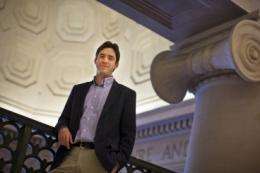Rethinking the fall of Rome's republic

When Julius Caesar crossed the Rubicon -- a river in northern Italy -- in 49 B.C., leading what was effectively his own personal army, he triggered a set of changes that resonated through the ancient world for centuries afterward. Caesar soon occupied Rome, defeated Pompey the Great and his other rivals, and set in motion the transformation from a republic to an imperial monarchy. The constitutional principles that had guided Rome’s rise, over centuries, from a small village to an all-conquering metropolis were suddenly swept away.
Ever since, historians have debated why the republic failed — and how Caesar was able to raise an army that backed him rather than the senate and magistrates of Rome. “These were effectively mercenary armies, loyal to the individual general rather than the city-state,” says William Broadhead, an associate professor of history at MIT. “How did this situation arise?”
Using a variety of sources, from ancient texts to new archaeological evidence, Broadhead has crafted a novel hypothesis about how Caesar — as well as Sulla a few decades before, and Augustus several years later — could march on Rome with his own legions.
“My interpretation is a demographic one,” Broadhead says. “Ancient Italy was a place of high geographical mobility, instead of being a place filled with sedentary peasants, which is the stereotypical image.” People in towns throughout the Italian peninsula, from whose numbers the Roman Republic traditionally recruited its army, often traveled either to the newly conquered outposts of the Roman world, or throughout Italy, in search of better living conditions.
The Romans had previously used a rigid list, the formula togatorum, to determine how many conscripts should be drawn from which town, stubbornly refusing to change the list over time. But as the population shifted around, Broadhead notes, it became “more difficult for the Roman state to monitor and control that movement, and so the system of military recruitment that had been based very rigidly on the geographical distribution of population dissolved.”
The result, he adds, was “a new system of recruitment where a powerful general goes to the population and says, ‘Will you all fight with me?’ The answer is ‘Yes,’ because any such volunteers were likely to enjoy the spoils of war. Population movement led to the personal client army of the late republic, which has long been recognized as a key to understanding its fall.”
Immersion in the layers of Rome
Broadhead was introduced to ancient studies because his high school required Latin, although his first impression of the language was of its difficulties. “My first year of Latin was neither pleasant nor particularly successful,” he recalls. “But the second year was great. I had a fantastic teacher who was very inspiring.”
Broadhead continued to study Latin and ancient Greek as an undergraduate at Middlebury College in Vermont, but had not visited Italy until he spent a semester abroad, at the Intercollegiate Center for Classical Studies in Rome.
“The texts are always part of your arsenal in trying to understand Roman culture and society, but the buildings, the inscriptions, the spaces made it come alive for me,” Broadhead says. “You walk out and there’s a Roman temple. All these layers are there, ancient, modern and everything in between. It is very striking.”
From that point forward, Broadhead says, he was fully committed to the idea of studying ancient history. “That trip to Italy was a turning point. That’s when I became an ancient historian, and also when I fell in love with Italy, both ancient and modern. Since then almost everything I’ve done in my life has been part of an attempt to make sure that Italy would be part of my life.”
After graduating from college, Broadhead received his MA and PhD from the University of London, a major center for classical studies and scholarship on Roman Italy in particular, and taught for two years at the University of Bristol in England before joining MIT in 2004. He received tenure earlier this year.
From texts to digs
The ancient texts used to interpret the fall of the Roman republic have been the same for centuries — principally Livy, Plutarch and Cicero. One thing that has changed is the addition of recently uncovered archaeological evidence, ranging from the remains of ancient urban centers, which allow for new estimates of the changing sizes of towns, and even signatures on individual pieces of pottery, which can show the geographic origins of the artisans who made them. Such pieces of physical evidence provide clues about the mobility of ordinary people who lived on the Italian peninsula.
Broadhead is incorporating these new forms of evidence into two forthcoming books. One, Hegemony and Mobility in Roman Italy, will detail his hypothesis about the transient nature of Italy’s population and its effects on the republican army over time. Another, Imagines Italicae, to be published in a few months by the Institute of Classical Studies in London, is a joint project co-authored with five other scholars that examines building inscriptions in their archaeological context.
In the meantime, Broadhead continues an active teaching schedule. In an effort to bring the same sense of excitement and historical imagination to students that he himself experienced when younger, Broadhead has been active in leading archaeological tours of Italy for MIT undergraduates. The visits take place every January during the Institute’s Independent Activities Period, and typically have about 15 students visiting ancient sites in Rome, Herculaneum and Pompeii, along with Broadhead and professors Eric Goldberg and Steven Ostrow acting as guides and lecturers.
“One of the most striking moments is when you come around the corner and see the Pantheon for the first time, in the middle of a fully functional modern piazza,” Broadhead says. “As one of my professors said to me, when I was a student, ‘You experience that for the first time only once, so make sure you enjoy it.’”
Provided by Massachusetts Institute of Technology















